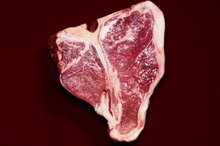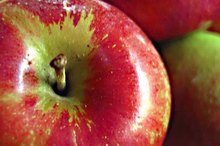Carbonic Acid in Foods
Carbonic acid is produced when carbon dioxide is dissolved in water. Carbonic acid is a weak acid and is used by all mammals to buffer blood, as it is an intermediary in respiration. Carbonic acid, found in all carbonated beverages, is responsible for their fizz. It is also present in fermented foods as a byproduct of the fermentation of bacteria. In small quantities, carbonic acid is not thought to be harmful to people.
If you are experiencing serious medical symptoms, seek emergency treatment immediately.
Carbonic Acid in Nature
It is even present in glacier ice, although in lesser amounts. Carbonic acid is a very weak acid, although it can contribute to erosion over time. Increased carbon dioxide in the atmosphere has caused more carbonic acid to form in oceans and is partially responsible for the oceans' slight increase in acidity over the last hundred years or so.
Carbonic Acid in Foods
Acid Forming Foods Vs. Alkaline Forming Foods
Learn More
Carbonic acid is present in fermented foods as the waste produced by bacteria that feed on decomposing food, explains Michelle McGuire in “Nutritional Sciences.” Gas bubbles produced in food are usually the carbon dioxide from carbonic acid and a sign that the food is fermenting or going bad 1. Fermented grains and vegetables also contain beneficial bacteria that can keep potentially pathogenic microorganisms in check within your intestines and enhance the production of vitamins B-12 and K.
Carbonic Acid in Beverages
Carbonic acid is also known as carbon dioxide solution and dihydrogen carbonate. Carbonic acid forms during the process of water carbonation, which produces the effervescence or fizz of soda pop and soft drinks, as noted in “Dictionary of Food Science and Technology.” Carbonic acid contributes to the high acidity of soda pop, but the refined sugar content and phosphoric acid are mostly responsible 2.
Effects
PH & Weight Loss
Learn More
Your red blood cells can dissociate a hydrogen atom from carbonic acid and turn it into bicarbonate, which readily dissolves in blood plasma and acts to buffer your blood, according to “Medical Biochemistry: Human Metabolism in Health and Disease.” In smaller quantities like these, carbonic acid is likely harmless 3. The erosion and decay of teeth caused by high consumption of soda pop are related primarily to sugar content and perhaps phosphoric acid.
Related Articles
References
- “Nutritional Sciences”; Michelle McGuire; 2007
- “Dictionary of Food Science and Technology: 2nd Edition”; International Food Information Service; 2009
- “Medical Biochemistry: Human Metabolism in Health and Disease”; Miriam D. Rosenthal and Robert H. Glew; 2009
Writer Bio
Sirah Dubois is currently a PhD student in food science after having completed her master's degree in nutrition at the University of Alberta. She has worked in private practice as a dietitian in Edmonton, Canada and her nutrition-related articles have appeared in The Edmonton Journal newspaper.









